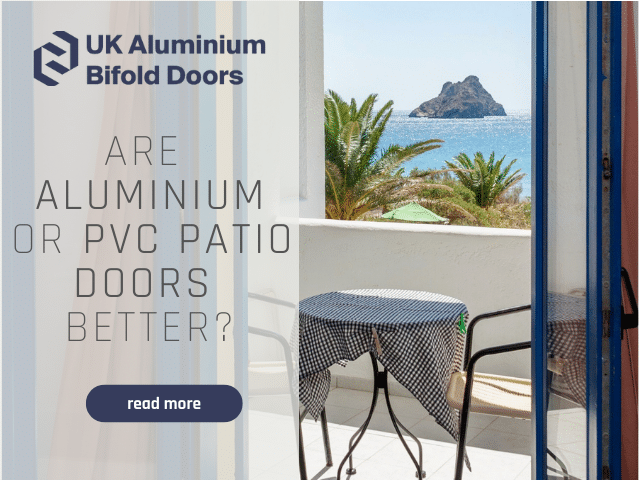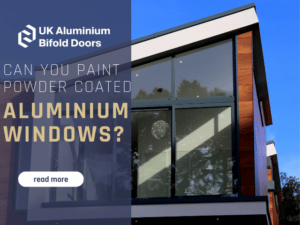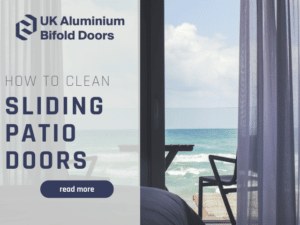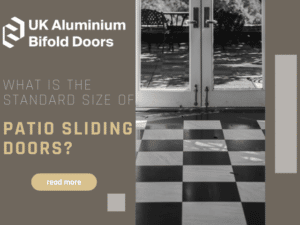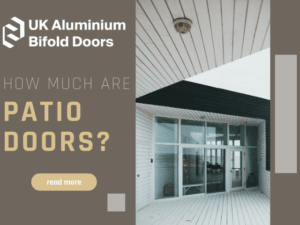Patio doors can add a lot to your home aesthetic. They are great for keeping bad weather out and ensuring you’re safe inside.
But how do we know which materials for sliding doors are best for our patios?
That’s where we come in; we’ve compiled a guide on whether uPVC sliding doors or aluminium doors are better for your home, to take the headache out of home improvement.
Let’s get our sliding door on.
What to Consider When Looking at Sliding Doors
Before we get into which door is best, you should consider a few things before buying sliding doors for your patio.
- Thermal efficiency: This refers to whether a material offers some insulation. Doors lose a lot of heat during the winter, so most people want one that retains warmth as much as possible, which lowers your heating bill and reduces your carbon footprint.
- Size: The space size that you need your patio door in will affect the type of door you can choose, so understanding the standard sizes of patio doors is key. French doors and bifold doors are different, for example, and require different spaces to install – but more on door types shortly.
- Sightlines: One of the main things to consider is how much of the door you want to be visible. Do you want more glass to show or more of the frame material? Sturdy door frame materials can contain a thicker and larger piece of glass that lets in more natural light.
- Designs: Each type of door material comes in a range of designs; some are sleek and modern, while others are more traditional. You need to select a door that will match your home aesthetic.
- Colours: This shouldn’t be your first consideration – but it’s also not an afterthought. You don’t want to have your heart set on a door type only to find out that it doesn’t come in the colour you want.
- Glass glazing: You’ll need to consider the type of glass going into the door. Are you looking at double or triple glazing? Before making your choice, look at what each glass option offers in terms of thermal efficiency.
- Maintenance: This is often the last thing we think about when buying a door, but it’s crucial. You don’t want to be stuck with something you can’t maintain, which becomes an eyesore. Door materials have different upkeep requirements.
- Security: We all want to be safe – that’s a given – and the number one way to keep your home safe is to have everything on the outside secure and well-maintained to ensure nobody can get in. Each type of door has a different set of safety measures, so be sure to look into this before making a purchase.
Need more help? Here are further advice and door-buying guides.
What to Know About uPVC Sliding Patio Doors
uPVC stands for Unplasticised Polyvinyl Chloride, a lightweight plastic used for many different types of building materials.
It has replaced most plumbing fixtures (drainpipes and gutters) as it is cheaper and sturdier. You’ll also see it replace older windows and sliding doors when moving from single glazing with the more thermally efficient double glazing.
uPVC is quite robust, and because of its many uses, it is a popular option for door replacements, such as upgrading from timber to lightweight plastic.
This material comes in various colours and designs to complement your home’s aesthetic cheaply and efficiently.
Unfortunately, uPVC often looks quite plasticky, which isn’t aesthetically pleasing, but there are some “wood grain” looks available.
However, compared to other materials on the market, uPVC isn’t the most robust option. It does offer thermal efficiency, however, which is excellent during the winter.
Before running off to get uPVC sliding doors, one big thing to consider is that plastic does bend and warp in the heat, meaning you may need to replace your doors more often.
This bending can affect how effectively your sliding doors keep out bad weather and maintain thermal efficiency.
What to Know About Aluminium Sliding Doors
Aluminium sliding doors are a very popular option for patios because the material is solid and can take a lot more pressure and damage than other, more traditional materials like timber or plastic.
Aluminium sliding doors are the way to go if you’re looking for doors that will last for years and weather every storm.
Since they are so strong, aluminium sliding doors provide a lot of security; an intruder stands a good chance of getting caught while trying to get in. Aluminium sliding doors also offer you the option to add double or triple gazing to your doors, adding even more security and thermal efficiency.
Depending on your needs, we offer several glazing options, including double-glazing, triple-glazing, and laminated glass. You can view our range of doors here.
Aluminium Sliding Doors vs uPVC Sliding Doors—Price
There are a few things to bear in mind when it comes to budget for sliding doors for your patio and how much patio doors are. First of all: it’s not all about the upfront price.
If we look at the initial cost, uPVC is cheaper because it is plastic, whereas aluminium is metal, and far more durable.
Additionally, aluminium lasts a lot longer than uPVC in the long run. So, if we consider the replacement rate, an aluminium door is cheaper, just not upfront.
If we look at things from an energy-saving perspective, you’ll also save money having aluminium sliding doors because they offer more insulation, meaning less heat needed in the home.
Aluminium Sliding Doors vs uPVC Sliding Doors—Security
So, we already know both doors are sturdy, but is one a safer option?
Aluminium sliding doors win in the security race because they are insanely strong and allow for very thick glazing that is nearly impossible to get through.
Our sliding doors are PAS24 compliant with a sleek multipoint locking system to keep your home safe while still looking great.
uPVC is strong and will keep intruders out, but not to the same degree as an aluminium sliding patio door.
Aluminium Sliding Doors vs uPVC Sliding Doors—Thermal Efficiency
Both aluminium and uPVC doors offer thermal efficiency but at different levels. Aluminium sliding doors are more efficient because of the materials used.
While uPVC offers insulation, it can expand in the sun, compromising its weather resistance and draught protection.
Once doors are compromised with swelling and damage, it isn’t easy to evaluate whether or not their insulating properties remain.
Aluminium is the way to go if you want lasting sliding doors. Our doors have a 1.4 U W/m2K insulation value and a rubber tubular gasket to protect your door from bad weather.
Additionally, our glass variations add to the door’s insulation properties. Something to consider when choosing between double or triple glazing.
The whole point of insulation is to save money on energy bills, but if you’re spending the same amount replacing the doors every few years, what’s the point?
That’s why aluminium is our preferred material. It lasts up to a decade with very little upkeep.
uPVC Sliding Doors vs Aluminium Sliding Doors—Aesthetics
Now, onto the fun bit: which door looks better while still providing superior functions?
uPVC sliding doors have some great design options that look similar to timber, which some people prefer.
Aluminium sliding doors look like sleek and modern metal, perfect for newer or refurbished homes.
The good news? We have a whole range of aluminium products, including:
- Aluminium bifold doors—A collection of glass panels that fold back on each other, creating a fan-like pattern.
- Aluminium French doors—A classic two-door design that opens from the middle.
- Aluminium patio doors—A two or three-panel sliding door that overlaps.
Plus, a range of aluminium windows and roof lanterns to add to the overall design of your home.
Aluminium allows you to choose what works best for your aesthetic, and you can customise it and change the colours and design features.
Need some help on what to put on patio doors? We’re here to help.
Our aluminium sliding door colour options include white, black, and grey – all perfect for a contemporary style home. Plus, the matching aluminium windows look stunning.
Where our products differ from other sliding doors is in our aluminium sliding patio doors’ sightlines. The track width on a double door is 120mm, and a triple track is 183mm. That’s slim compared to other doors, particularly considering how big some sliding doors can get.
We strive to provide sleek sliding door designs that can hold up the door’s weight and provide maximum weather resistance and security.
Regular uPVC sliding doors are thick, meaning they are much bulkier. Also, they generally come as they are, with little room for specialised design tweaks.
Home aesthetics are personal, so you must choose what looks best with the rest of your home design. But what is essential to consider is the door’s functions and capabilities.
For example, selecting uPVC sliding patio doors based on the colour might not be the best thing if you want a door that lasts more than five years and has little maintenance.
It’s about balancing your design wants and your functional needs.
Do you want expansive glazed panels? Yes, they look good, but they can get mighty heavy when you add lamination and glazing for thermal efficiency.
Aluminium doors can give you peace of mind, knowing your glass isn’t going anywhere, come rain or shine.
Are Aluminium Sliding Doors or uPVC Sliding Doors Better?
This will depend on your personal needs; generally, aluminium sliding doors are the better option. They are more robust, strong, and sturdy, meaning they can handle much more than average uPVC sliding doors.
Aluminium is also more thermally efficient and offers a modern classic design while maintaining high function for weather resistance and carrying more weight.
Plus, aluminium sliding doors are much more secure, with options for thicker glazing on window panels and better lock systems.
On the other hand, uPVC sliding doors are better for homes with an antique feel that needs a door that looks like timber but offers more safety and sturdiness than regular wood.
FAQs
Are aluminium sliding doors more expensive than uPVC?
Yes, the initial cost is more expensive when buying an aluminium door. However, a uPVC door might cost more in the long run because they need replacing more frequently. uPVC can warp in the sun, affecting its weather resistance; this doesn’t happen with aluminium.
Are uPVC doors more durable than aluminium?
No, uPVC is not as strong as aluminium, as it’s made from plastic and not metal. However, it is more robust than timber.
Are aluminium doors more secure than uPVC?
Aluminium doors are more secure than uPVC sliding doors because they are made of high-grade metal, allowing for a thick glaze on windows, and usually have a more intricate locking system.
Can aluminium frames warp in heat?
No, that’s one of the biggest pros of selecting an aluminium frame over uPVC. Aluminium is made from metal, meaning heat from weather won’t make it bend or morph.
Should my aluminium windows have thicker frames?
Not necessarily, and that’s why this material is so popular. Aluminium is metal, meaning it can take on a lot of weight and force compared to plastic and wood. So, you get the sturdy nature of the metal without the need for a bulky aesthetic.
Can I get aluminium replacement doors?
Yes! If you’re doing a house upgrade and need new windows and doors, you can have your new fixtures explicitly sized for your space. By choosing aluminium, you’ll save on energy bills, enjoy ultra-slim sightlines, and have a low-maintenance door that will last for years to come.
Sources:

